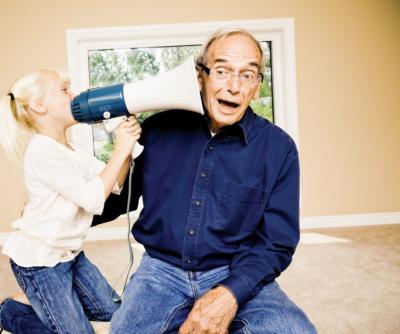Do you have difficulty hearing?

As an otolaryngologist with special interest in hearing loss, I see many older adults with hearing loss. Most have delayed seeking treatment until they cannot communicate with their loved ones and their quality of life begins to suffer. One out of three persons above the age of 60 and one out of two above the age of 85 has agerelated hearing loss.
Hearing is one of our special senses. It helps us to connect with family and friends and to maintain relationships. It allows us to listen to birdsong, enjoy music, laugh and experience the little joys of life.
Age-related hearing loss is called presbycusis. It is the most common cause of hearing loss in older adults, worsens slowly over several years, and affects both ears. It affects high-pitched sounds first and then the low-pitched sounds. Age-related hearing loss is related to a combination of factors. The most important factors that occur are changes in the blood flow and degeneration of the inner ear, hearing nerve and brain. These are influenced by other factors like diabetes, heart disease with poor circulation, exposure to loud noise, family history, smoking and certain medications.
Typical symptoms include having difficulty hearing children’s or women’s voices or difficulty understanding speech in the presence of background noise. Other signs include turning up the volume on the television louder than normal, complaining that others are mumbling and not speaking clearly and asking other people to repeat themselves.
Hearing loss occurs in the ears, but the real effects of hearing loss occur in the brain. The hearing centers in the brain make sense of the sound heard in the ears and give it meaning. The adage “use it or lose it” is so true here. The nerve pathways connecting the ear to brain hearing centers shut down with hearing loss as they are not being stimulated with sounds. Older adults with hearing loss can have difficulty participating in social activities, enjoying music and even find it difficult figuring out the location of a sound. This may lead to anxiety, emotional issues, paranoia, sadness, depression and, eventually, social isolation. Hearing loss is one of the top risk factors for developing dementia. A study at Johns Hopkins reported that moderate hearing loss tripled the risk, while severe hearing loss was associated with five times the likelihood of developing dementia.
Older adults with hearing loss may not seek evaluation because they don’t comprehend they are experiencing hearing issues. Additionally, even if they recognize they have a hearing issue, they don’t want to admit it, as hearing loss is perceived as a stigma of old age.
 The
American Speech Language Hearing Association recommends hearing
screening for adults at least every decade through age 50 and after that
at three-year intervals.
The
American Speech Language Hearing Association recommends hearing
screening for adults at least every decade through age 50 and after that
at three-year intervals.
Screening for hearing loss includes testing if a person can hear a whispered voice, a finger rub at a specific distance or answering a single question, “Do you have difficulty hearing?” This can be followed up with a more formal ear exam and audiometric hearing test.
Treatment of age-related hearing loss depends on the severity of the loss. The first step of treatment is hearing amplification with hearing aids. Studies have reported that only up to 20% of individuals with hearing loss use hearing aids. This is often related to the cost of the hearing aids, lack of reimbursement or associated stigma of old age. Occasionally, patients who obtain hearing aids stop using them due to discomfort, recurring cost of batteries and challenges handling them. Today, most hearing aids have digital technology, which is cosmetically appealing.
Other treatment options include:
• Assistive listening devices that amplify directional noise with a microphone.
• Cochlear implants for those who do not benefit from hearing aids.
• Cochlear implants in one ear paired with a hearing aid in the other.
In the 1980s, FDA approved cochlear implants for eligible adults with hearing loss. Unlike hearing aids that amplify sounds, cochlear implants bypass the damaged inner ear and directly stimulate the hearing nerve. Eligibility for cochlear implants requires evaluation by a team consisting of a cochlear implant surgeon, audiologists and radiologists. The device is surgically implanted, followed by activation of the implant after the healing is completed. The patient then starts therapy to relearn associating signals from the implant with sounds and speech. Cochlear implantation is a safe procedure in older adults and there are no age limits for performing the procedure.
In conclusion, hearing loss in older adults:
It affects quality of life and is a risk factor for dementia.
It can be prevented from worsening by avoiding loud sounds, using ear protection when you are around loud music, mowing or hunting and by following a healthy lifestyle.
Can be treated with different treatment options depending on the cause and severity of the hearing loss.
Get evaluated for hearing loss. It will help improve your quality of life, and your relationships with family and friends.
Gauri Mankekar MD, Ph.D., is an assistant professor of otolaryngology head & neck surgery at LSU Health Shreveport.
